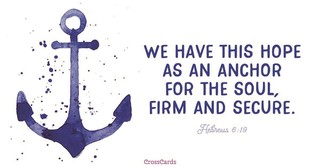
- Recent Translations
- All Translations
Hebrews 6:19
Share
Settings
Hebrews 6:19 in Other Translations
Hebrews 6:19 Meaning and Commentary
Which [hope] we have as an anchor of the soul
This world is as a sea; the church in it, and so every believer, is as a ship; the port that is bound unto is heaven; Christ is the pilot, and hope is the anchor: an anchor is cast on a bottom, out of sight; and when the ship is in a calm, or in danger of a rock, or near the shore; but is of no service without a cable: and when cast aright, keeps the ship steady: so hope is cast on Christ; whence he is often called hope itself, because he is the ground and foundation of it, and who is at present unseen to bodily eyes; and the anchor of hope without the cable of faith is of little service; but being cast aright on Christ, keeps the soul steady and immovable: in some things there is a difference between hope and an anchor; an anchor is not of so much use in tempests as in a calm, but hope is; the cable may be cut or broke, and so the anchor be useless, but so it cannot be with faith and hope; when the ship is at anchor, it does not move forward, but it is not so with the soul, when hope is in exercise; the anchor of hope is not cast on anything below, but above; and here it is called the anchor of the soul, to distinguish it from any other, and to show the peculiar benefit of it to the soul. Pythagoras makes use of the same metaphor F24;
``riches (he says) are a weak anchor, glory: is yet weaker; the body likewise; principalities, honours, all these are weak and without strength; what then are strong anchors? prudence, magnanimity, fortitude; these no tempest shakes.''But these philosophical moral virtues are not to be compared with the Christian's grace of hope, which is
both sure and steadfast;
it is in itself a grace firm and stable; it is permanent and can never be lost: and it is still more sure and steadfast, by virtue of what it is fixed upon, the person, blood, and righteousness of Christ; and by the immutability, faithfulness, and power of God it is concerned with; and through the aboundings and discoveries of divine love, grace, and mercy; and from the instances of grace to the vilest of sinners:
and which entereth into that within the vail;
the holy of holies, heaven itself; in allusion to the vail which divided between the holy and the holy of holies: the things within the vail, or in heaven, which hope entering into fixes upon, are the person of Christ, who is entered there, and appears in the presence of God for his people; his blood which he has carried along with him, and by which he is entered there; his justifying righteousness, by which the law is fulfilled, the two tables of stone in the ark of the testimony; the sweet incense of his mediation, which is continually offered up by him; the mercy seat, or throne of grace, on which Jehovah sits as the God of grace; and all the glories of heaven; all which hope is concerned with, and receives strength and rigour from: and their being within the vail, is expressive of their hiddenness and invisibility at present, and of their safety and security, as well as of their sacredness; and this shows a difference between the hope of believers and others, whose hope fixes upon things short of these; and likewise the great privilege of a believer, who being made a priest unto God, has liberty and boldness to enter into the holiest of all. The Jews F25 speak of a vail in the world to come, which some are worthy to enter into.
F24 Apud Stobaeum, Serm. I.
F25 Zohar in Gen. fol. 73. 3.
Hebrews 6:19 In-Context
Cross References 1
-
1.
Leviticus 16:2 ;Heb 9:2,3,7
